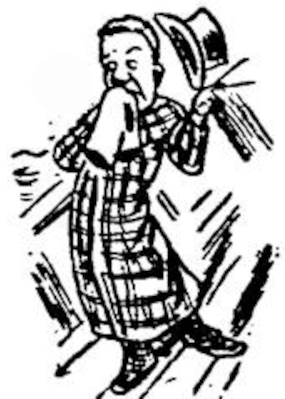This article has been transcribed from a copy of the Cardiff Times in the online collection of scanned Welsh newspapers 1804-1919 in the National Library of Wales, with grateful recognition of the free access accorded to all readers. Paragraph breaks have been introduced for easier reading.
A series of political letters critical of the government of King George III appeared in the Public Advertiser from 21 January 1769 to 21 January 1772 over the name of ‘Junius’, and rival theories as to the authorship are still alive, and constitute one of the longest-running disputes in historical literature. ‘Whether a man can marry his widow’s niece’ is a spoof on ‘A Table of Kindred and Affinity wherein whosoever are related are forbidden in scripture and our laws to marry together’, which used to be printed at the back of the Anglican prayer book. The Table famously began, ‘A man may not marry his grandmother’. — David Skilton
EVERYONE, I should think, good sir, knows what a frightful nuisance the child which is thirsting for information and perpetually asking questions (some of them of the most delicate nature) becomes – the child which ingenuously interrogates you as to why grass is green, why the sea is salt, or why a man's nose is necessarily between his eyes and his lips; well, not even that child is gifted with such a superior degree of demoniacal ingenuity in the proposition of ‘posers’ as is the average person who writes in for information regarding some point or other on which he (or she, for it is often a she) is dubious. Many of these correspondents have palpably had bets on the result of your reply, and they therefore (having possibly found out from another source after the bet was made that they were utterly wrong) frame their queries as foggily as possible in order to confuse the main issue, and I have reason to believe that they are highly indignant when you decide the point against them, and they therefore express an intention of never taking your ‘detestable sheet’ again. Some of these correspondents are gushing fibbers, who simply write to you a fantastic ‘fairy’ story (as though you were to be caught by such an old game) of their alleged wrongs or a record of their feelings and sentiments (as though you cared two straws about their highly-strung feelings) in the expectation of a sympathetic response. Others, again, write in with varying degrees of ingenuity fishing for an advertisement. Perhaps the biggest bore of the whole number is the person who imagines that you have nothing else to do than to read his literary works (unpublished, of course) and to pass an opinion – a ‘candid’ is what he always asks for – upon them. He sends a five act play, or an unpublished novel in seventy chapters, written in a shockingly-bad hand, most of the letters suggesting distorted spiders, and he requests that you will read it carefully through, and tell him without reserve whether it is not as good as G. R. Sims or William Black can manufacture. He modestly adds that friends upon whose judgment be places the most implicit reliance declare that it is better than either of those two authors – or both of them rolled into one. This last stroke is a sort of hint to you that if you cherish a different opinion you may write yourself down an ass. He quite artfully gums a few leaves together here and there, just to see when you return his MS. to him whether you I have taken the trouble to wade through.

‘Mr. Editor; Sir, do you think that the slight cast in my eyes amounts to a positive squint?’
Whilst this individual usually seems to think that he has a monopoly of your time, another sort of correspondent appears to labour under the belief that all the space devoted to answers belongs to him, and be therefore seeks to inform himself upon some three dozen abstruse points all for one penny postage. In the same letter be requires a history of the Pyramids; a short exposition of the differential calculus; the precise distance in inches between Puddleton-in-the-Hole (where he resides) and Yokohama; your opinion as to the authorship of the letters of Junius; a recipe for the cure of the mumps; the date of the birth of Kidd, the Pirate, and the circumstances of his marriage; a solution of the query as to whether a man can marry his widow's niece; a list of the works of the poet Close; material for an essay on the Man in the Iron Mask, and the name of the author of ‘Who killed Cock Robin’ [a traditional nursery rhyme]. Sometimes be omits to put a postage stamp on his communication, and when you do not reply to him at the length that he wishes, he writes to you an indignant protest, holding out the terrible threat that unless you mind your manners he shall probably cease to subscribe to the journal you represent.

Fancy portrait of the gentleman who writes in for a ‘really effective’ remedy for sea-sickness.
Sometimes he has got an acknowledged puzzle for you, and requests that you will solve it for him, no doubt in order that be may send the answer in to some other paper which has propounded the riddle and is offering a prize for the solution. Oh, he is nothing if not modest, I can tell you. Sometimes, too, he is the victim of a hoax. Some jocose friend has been what is vulgarly called ‘codding‘ him into an absurd bet, and he writes to ask you if it is a fact that dragons actually existed, or to inquire if you know the reason why the sea is salt. When you reply in a becomingly serious, yet bantering spirit to him, and his friend points out to him that he has been had on both sides, he is dreadfully wrath, though not with the original author of the joke, but with you, quite ignoring the fact that has wasted ever so much of your precious time. When you, on your part, attempt anything like a joke in reply to an absurdly frivolous query, you are regarded as a mere jester and a flippant and impudent fellow, and, ten to one. you will receive an irate letter of remonstrance. Well do I remember, sir, a young person who wrote in to say that her baby ‘was a teathing:’ what was she to do? I ventured to ask in reply (this was once upon a time when the duties of answering correspondents fell upon my wretched shoulders) whether the baby which was ‘a tea-thing’ was a cup or a saucer, and that woman's brother called at the office, and, in default of finding me, assaulted the young man who took in the ‘lost’ and ‘found’ advertisements, and was only satisfied that no insult had been intended when he had been felled by the office ruler twice in succession.
Girls who send their own photographs and want to know whether you really think they squint; girls who send the photographs of young men and desire to know whether you doubt that the simpering original will prove a good husband; girls who enclose a frowsy lock of hair (which you take up with the tongs) and want to know whether it is red or auburn; girls who want recipes for curing pimples, hair dye, and so on, are as common as blackberries, as are also girls who write somewhat in this style: ‘A young man took me home from a party the other night and pressed my hand three times, at the same time asking me whether I had read the‘Marriage a Failure’ letters. Do you think that he meant anything serious?’ A terrible creature is that who writes:-- ‘Can you tell me the name of the author of the following lines:-
Only a periwinkle
That on the sands he gave;
Only a sweet love token
To carry to the grave!’

‘Wha–a–a–at, sir, cannot allow me an answer at a column length?’
What on earth can be done with a young person who tortures one like that? Letters from palpable lunatics are by no means uncommon — letters informing one that the writer is the Redeemer come once again upon earth, and asking one what steps he should take to establish his identity. The only thing to be guarded against in the case of a correspondent like this is to prevent his having a personal interview, for he is apt to get excited and to throw things about. Man who are semi-lunatics and have astonishing patents for making ice out of linen rags or something or other of the same kind are common enough, and letters from injured (?) wives asking whether, their husbands having been away two years and upwards, they are free to marry again (if they have evidently got someone in their eye), are by no means uncommon. And after all one's trouble in going through volumes of statistics and copious books of references in order to reply to difficult queries; after all one’s irritation of temper begotten of frivolous and foolish questions, after all the contumely heaped upon one by indignant persons to whose liking one's reply has not been — there is one counter-balancing advantage to a student of human nature about the whole business — this advantage being quite apart from the pecuniary gain derived -- and that is that there is perhaps no other form of newspaper work which focusses before the student the folly, the vanity, the knavery, the ingenuousness, and the many-sidedness of frail human nature as replying to the queer queries posted in the Editorial letter box.
Last modified 26 February 2022